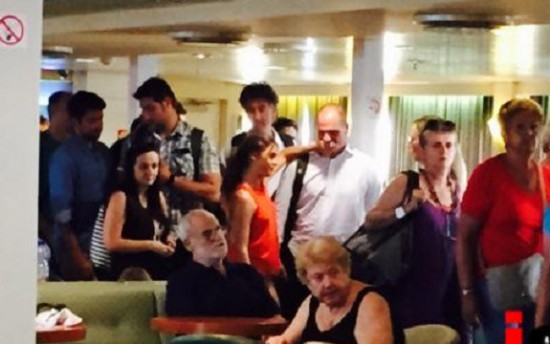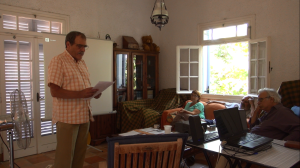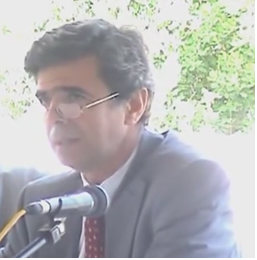
Varoufakis and family on the ferry to Aegina
A journalist complains that at the harbour of Aegina he was attacked by a member of the security for the former Finance Minister
There has been a hail of negative comment in response to Yanis Varoufakis’ message through Twitter that he will not be in the Parliament for the vote on Greece’s proposals to the European Union
Mr. Varoufakis cited family reasons in justification of his absence and shortly afterwards published through Twitter the letter with his vote in this evening’s parliamentary session, which he will not be attending.
Nevertheless, after this photographs circulated which showed him together with his wife on the ferry for Aegina, where he has a house. This, as it was to be expected, provoked even further comment.
It should be noted that according to Article 70a of the Parliamentary Regulations, parliamentarians can vote by mail only if they are on business abroad for the government or the parliament.
A short time ago protothema.gr complained that one of their journalists who tried, together with a photographer, to approach Mr. Varoufakis as he was disembarking, was attacked by a member of the security of the former Minister of Finance. The website notes that one of the bodyguards of Yanis Varoufakis attacked Frixos Drakontidis when the journalist tried to extract a statement from the former minister.
Protothema indeed says that the SYRIZA parliamentarian in effect ordered the police to remove the journalist by force, with the result that one of the three policemen in Varoufakis’ personal guard attacked Mr. Drakontidis, grabbed him by the neck and shoved him away on the hatchway, with the result that he fell over and was injured on the head.
According to reports, the Minister for Protection of the Citizen Giannis Panousis was informed of the attack on the protothema journalist and undertook to investigate the incident in depth. The journalist Frixos Drakontidis has already reported the incident to the island’s harbour authority and proposes to institute legal action against the former minister, his wife and the three security guards.
A few minutes after publication of the relevant story Yanis Varoufakis responded with a tweet.
(Yanis Varoufakis: Fortunately there are people who respect what it means that I wish to spend the weekend with my little daughter before she returns to Australia where she lives.)
Source: Lifo http://www.lifo.gr/now/politics/70685?ref=yfp#comment
From the absurd to the tragic?
Anyone living through, or even just following, developments in Greece knows all too well the meaning of expressions such as “critical moments”, “climate of tension”, “dramatic overturn”, “pressing on the limits”. From Monday something new, ostentatious and blatant will be added to all of these: the absurd.
The word may seem strange, or an overstatement. But how else could one characterize the total reversal of the meaning of such an amazing event as the referendum of 5th July, only hours after its occurrence, and indeed by its own exponents? How could one explain that Messrs Meimarakis and Theodorakis, that is to say the heads of the camp of the (crushingly) defeated, should have become the official spokespersons for the line being followed by the Greek side, and should be promenading from pillar to post laying down its terms? How is it possible for a devastating “no” to the memorandum policies of austerity to be “interpreted” as a green light for a new memorandum? And to put it in commonsense terms: if they were disposed to sign something even worse and even more binding than Juncker’s proposals, what was the point of the referendum, or rather of the struggle to achieve the “no” and, naturally, of its stunning consummation?
The sense of the absurd is not just a product of this unexpected reversal in the dynamics of the situation. It stems above all from the fact that all of this is unfolding before our eyes “as if nothing has happened”, as if the referendum were something like a collective hallucination, which suddenly ends, leaving us to continue uninterrupted what we were doing before. But because we have not all become lotus-eaters, let us be permitted to give a brief résumé of what has taken place in the course of the last days’ unbelievably rapid developments.
So, last Sunday the Greek people staggered Europe and the world, responding en masse to the government’s call and, in conditions unprecedented by the post-war standards of any European country, overwhelmingly voted “no” to the extortionate and humiliating proposals of the lenders. Both the extent of the “no” and its qualitative composition, with its enormous lead in the working class and popular strata and in the younger generation, testify to the depth of the transformations that have been occurring, or rather that have crystallized in such a short time, in Greek society. Friday’s mass mobilizations, the climate “from below” that has prevailed over the last days, not to mention the enthusiastic wave of international solidarity, testify to the huge potential that is opened by the popular intervention in favour of a political choice for conflict.
But from the morrow of that “day that shook the world”, before the victory cries in the country’s public squares had even fully died away, the theatre of the absurd began. Under the aegis of the actively pro-YES President of the Republic, the government summoned the heads of the defeated parties to elaborate a framework for negotiation positing the euro as unpassable outer limit of the Greek position and declaring specifically that it has no mandate for a rift. Public opinion, still affected by the joyful haze of Sunday, watches as the representative of the 62% accepts subordination to the thinking of the 38% in the immediate aftermath of a resounding victory for democracy and popular sovereignty.
On Tuesday the government, with no “proposal” to make, transfers its operations to Brussels for the extraordinary Eurogroup meeting and, as is absolutely logical, finds itself confronted with a new, abrupt and even harsher ultimatum. The next day Euclid Tsakalotos inaugurates his duties as Finance Minister (in the interests of brevity we pass over the factor of the “Varoufakis resignation”, simply noting that it was a demand of the lenders) by sending to the ESM (European Stability Mechanism), the organization that manages the greater part of the Greek debt, a letter requesting a new loan of 50 billion euros, which will be accompanied of course by a third memorandum[1]. It is envisaged, indeed, that the Parliament will begin on Monday to vote the relevant enabling legislation.
The Tsakalotos letter continues with references, inter alia, to Greece undertaking “to honor its financial obligations to all of its creditors in a full and timely manner.” It is obvious that despite the assurances that were heard after the proclamation of the referendum for “restarting discussions from scratch” the “negotiations” (which are negotiations only in name) are continuing exactly from where they left off, with the Greeks lowering the bar for their opponents to a point that is politically unsustainable in Greece, as we correctly judged at that time.
The same day, pending the new Greek “proposals”, which were to be “reliable, detailed”, etc., i.e. made to measure for a memorandum, the Prime Minister addressed the European Parliament and declared that “if my aim had been to take Greece out of the euro, I would not immediately after the closing of the polls have gone to make the statements I made and interpret the result of the referendum not as a mandate for a break with Europe but as a mandate for reinforcing our negotiating efforts so as to arrive at a better agreement”[2]. This amounts to more or less open acknowledgement that the result of the referendum was being “interpreted” with a specific end in mind, that of negotiation at all costs and avoidance of a rift.
In the same speech the Prime Minister outlined quite succinctly the philosophy that for many weeks has been informing the whole stance of the Greek side and to which the “parenthesis” of the referendum has not brought the slightest change: “In these proposals we have evidently undertaken a powerful commitment to achieve the fiscal goals that are required on the basis of the rules, because we recognize, and respect, the fact that the Eurozone has rules. But we reserve the right of choice, the right of being able, as a sovereign government, to choose where we shall place, and add to, the burden of taxation, so as to be in a position to attain the required fiscal objectives.” So the framework is given: it is that of the restrictive measures which secure fiscal surpluses and aim at the repayment of debt. It is incontestably the framework of the memoranda. The “disagreement” is over the “distribution of the burden”. It involves a (supposedly) “socially more just” variant of austerity, which will be presented as “redistribution” at the same time as it perpetuates the recession (every reference to commitment to non-recessionary measures has been effaced) and impoverishment of the majority.
In the meantime, and while these soothing reassurances are being put forward that demolish what has remained of SYRIZA’s programmatic commitments, there is a ramping up of the state of political siege that the country is enduring, with the European Central Bank holding closed the spigot of liquidity and trimming even further the value of bank bonds, leading ineluctably to collapse. And yet! Despite the gravity of the situation and despite the fact that through the imposition of capital controls part of the road has already been covered, nobody, apart from Costas Lapavitsas and some members of the Left Platform, is speaking of the self-evident and basic measures of self-protection that are necessitated by circumstances of this kind, starting from public control and nationalization of the banking system. The explanation for this is of course very simple: anything of this kind would place Greece with one foot outside the euro, which is precisely the absolute fetish on which the government is impaled, just as an – in no way radical – economist such as Paul Krugman ascertains that “the greater part of the cost has already been paid” and that it is time for Greece “to reap the benefits”[3].
A very simple conclusion emerges from all this: with the moves it has made in the last week, the government has achieved nothing other than total restoration of the previous entrapment, from a much more unfavorable position, under the pressure of even more relentless economic asphyxiation. As for the political advantage, the powerful injection of political capital it derived from the referendum, it hastened to expunge it in record time, following at all points the line of those who had opposed it and who have every reason to feel vindicated, despite being trounced at the ballot box.
But the referendum happened. It wasn’t a binge from which everyone has now recovered and it wasn’t a hallucination. On the contrary: the hallucination is the attempt to downgrade it to a transitory interlude for “letting off steam”, prior to resumption of the downhill course towards a third Memorandum.
Let us put this forward with all due clarity: any attempt to cancel the popular will for overturn of austerity and the Memoranda amounts to hubris in the ancient Greek sense of the term. Whoever dares to lead the country, and the Left, to surrender and to dishonor should be ready to face the corresponding Nemesis. If such is to be the culmination of the dementia of these days we are living through, let us at least be fully cognizant that for this tragedy there is not going to be any deus ex machina nor any merciful Athena to assuage the wrath of the Furies.
[1]The text of the letter here http://www.thepressproject.gr/article/79045/Auto-einai-to-Elliniko-aitima-ston-ESM-metafrasmeni
[2]Τhe full text of the Prime Minister’s speech here http://left.gr/news/omilia-tsipra-stin-olomeleia-toy-eyrokoinovoylioy-tin-Tetarti
[3]Paul Krugman’s article is here http://www.euro2day.gr/specials/opinions/article/1346935/kroygkman-o-megalyteros-logariasmos-toy-grexit-pl.html



